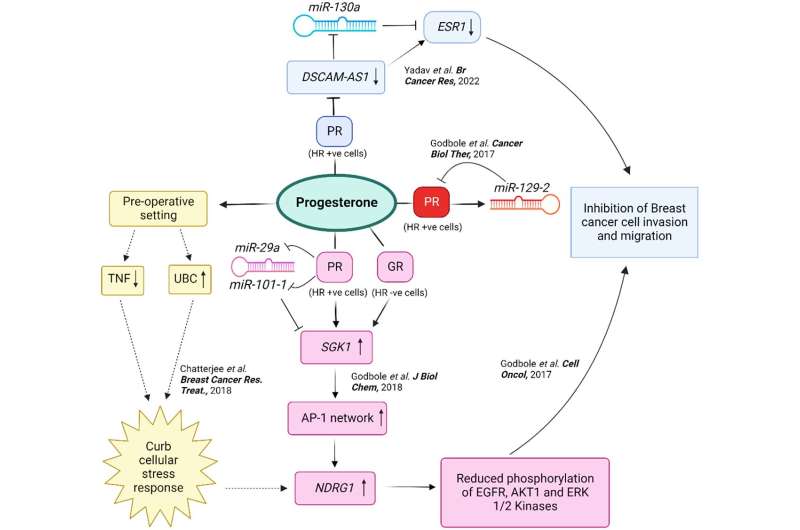This article has been reviewed according to Science X's editorial process and policies. Editors have highlighted the following attributes while ensuring the content's credibility:
fact-checked
peer-reviewed publication
proofread
Deciphering progesterone's mechanisms of action in breast cancer

A new research perspective was published in Oncotarget, titled "Deciphering the mechanisms of action of progesterone in breast cancer."
A practice-changing, randomized, controlled clinical study established that preoperative hydroxyprogesterone administration improves disease-free and overall survival in patients with node-positive breast cancer.
In this new perspective, researchers Gaurav Chakravorty, Suhail Ahmad, Mukul S. Godbole, Sudeep Gupta, Rajendra A. Badwe, and Amit Dutt from Tata Memorial Centre, Homi Bhabha National Institute and MIT World Peace University summarized evidence from their studies that preoperative hydroxyprogesterone administration may improve disease-free and overall survival in patients with node-positive breast cancer by modulating cellular stress response and negative regulation of inflammation.
"This research perspective is aimed to highlight the multipronged roles of progesterone in breast cancer that underlie the associated clinical response. We also present our opinion on the role of progesterone in overcoming endocrine resistance in the patients, especially by countering the genomic effects of overexpression and mutation of ESR1 and its targets," say the researchers.
Non-coding RNAs, particularly DSCAM-AS1, play a regulatory role in this process, along with the upregulation of the kinase gene SGK1 and activation of the SGK1/AP-1/NDRG1 axis. Progesterone-induced modification of the progesterone receptor and estrogen receptor genomic binding pattern is also involved in orchestrating estrogen signaling in breast cancer, preventing cell migration and invasion, and improving patient outcomes.
The team continues on to highlight the role of progesterone in endocrine therapy resistance, which could lead to novel treatment options for patients with hormone receptor-positive breast cancer and for those who develop resistance to traditional endocrine therapies.
"Overall, while preoperative hydroxyprogesterone administration appears to be a promising strategy for improving the prognosis of patients with node-positive breast cancer, the investigation of the mechanism of actions of progesterone in breast cancer remains an important area of research that holds great promise for improving patient outcomes," conclude the authors.
More information: Gaurav Chakravorty et al, Deciphering the mechanisms of action of progesterone in breast cancer, Oncotarget (2023). DOI: 10.18632/oncotarget.28455




















